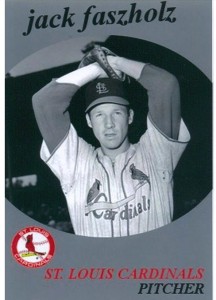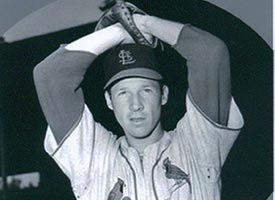By Melanie Ave
He was drafted as an amateur free agent by the Boston Red Sox and played for the St. Louis Cardinals’ farm club team, the Rochester Red Wings, for seven seasons. But his biggest claim to baseball fame may be that, between April and June 1953, Jack “Preacher” Faszholz wore the No. 41 jersey and pitched for the St. Louis Cardinals before he gave up baseball to become an ordained LCMS pastor.

Now, at the age of 86, the retired LCMS pastor, teacher and professor is keeping a close eye on the World Series matchup between the Red Sox and the Cardinals.
The following is an edited Reporter interview with Faszholz (JF).
Reporter: Tell us about your baseball career.
JF: I played for 12 seasons, mostly in the minor leagues. I signed with the Boston Red Sox. I was with them four years and then I was drafted by the Cardinals. I spent the last eight years in Cardinals. Seven of the eight I was with the Rochester Red Wings. I went to spring training with the Cardinals in 1953 and 1955. I started one game in National League play against the then New York Giants. My total experience at the National League level was that I pitched for 11 2/3 innings, five against the Giants. I was elected [to] the Rochester Red Wings Hall of Fame. I won more games than any pitcher in their franchise history.
Reporter: You were on the same team with baseball legend Stan Musial. What was he like?
JF: He made friends with everybody, very outgoing. When I was returned to Rochester after being in St. Louis, the Cardinals came to play an expedition game in Rochester. Stan went out of his way during batting practice to come up to me in the outfield and ask me how everything was going. That was the kind of personality he was.
Reporter: What was it like playing with and against some of baseball’s greatest?
JF: It was nice. It’s a different experience playing with the Major Leagues than playing in the minor leagues. The facilities, travel was different. Play was at a higher level. Times have really changed, particularly at the Major League level. There was not near the hype or [media] coverage. Communications has just exploded since those days. There wasn’t that much publicity. Now anything you say or do gets publicized.
Reporter: How did you get into baseball?
JF: I played American Legion ball at the high school level. I signed between my junior and senior year of high school. The reason for that was we were in the middle of [World War II]. A lot of professional players were in the service. A lot of the teams that played through the war years were made up of people like myself, too young, or classified not fit [for] military service or too old for military service.
Reporter: What did you do after your baseball career ended?
JF: After the Cardinals, I finished up at [Concordia Seminary, St. Louis]. My seminary career lasted over 10 years. I went a semester a year, only in the fall semester. I started in the fall of ’47. I graduated in the spring of ’58.
Reporter: And after you graduated from the seminary?
JF: My call was to Lutheran high schools in St. Louis. I started out at Lutheran Central, then to Lutheran South. I was on the faculty and was the athletic director. I was there a total [of] 20 years and then I took a call to Concordia University in Austin [Texas]. I spent 12 years teaching the New Testament and PE and health.
Reporter: What comparisons do you draw between being a professional athlete and an LCMS pastor?
JF: I think having had that experience helped, just dealing with people.
Reporter: Where do you live now? And your family?
JF: I live outside Belle, Mo., about 25 miles northeast of Rolla. I’m a member of Mount Calvary Lutheran Church in Belle. I’m married. I have six kids and, at last count, 14 grandchildren and eight great-grandchildren.
Reporter: Do you follow baseball much these days?
JF: Only when I can. Sometimes we don’t get good [television] coverage out here. I try to keep up a little. I’ve also volunteered to help out with the high school team.
Reporter: What team do you follow most?
JF: The Cardinals.
Reporter: Who are you rooting for in this year’s World Series since you played for both ball clubs?
JF: That’s self evident. (Faszholz laughs.)
Reporter: What did you think of the first game of the Series, when the Cardinals lost 1-8?
JF: I couldn’t understand how they played at crucial points. The errors really did them in. But onward and upward.
Reporter: Do you think the Cardinals will win?
JF: They sure have the talent to do so. You get to this point where you sort of have to be at the top of your game. Any lapses can hurt you.
Reporter: What do you think about some of today’s athletes who are Christians using their high-profile platform to share the Gospel of Jesus Christ?
JF: I think when the opportunity presents itself, you ought to give expression to what your feelings are and what your beliefs are.
Reporter: Do you ever see any of the guys you used to play with?
JF: No. That’s something I’ve always regretted.
Reporter: I bet you have some great stories from your baseball days.
JF: I have a lot of stories. I’m just thankful I had a God-given talent and opportunity to play professional ball, and particularly, even though briefly, to play in the Major Leagues. It was a great experience.
Melanie Ave is a senior writer and social media coordinator for LCMS Communications.
